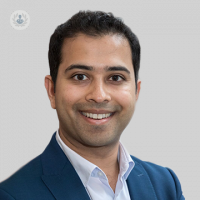Alopecia: the causes and treatment of hair loss
Written in association with:Dr Kapil Bhargava, leading dermatologist and expert in hair loss disorders, explains the different kinds of alopecia experienced by both men and women, and talks about how hair loss can be treated.

What is alopecia?
Alopecia is the medical term for hair loss. This encompasses any type of hair loss, whether it be temporary or more permanent. There are more than 20 types of alopecia and they can broadly be divided into those that cause scarring and those that are non-scarring.
What types of alopecia are there?
The most common type which affects men is male pattern hair loss. The female equivalent tends to be female pattern hair loss which develops much more slowly. There are other types of hair loss which are not hormone or genetic dependent and this includes those that are autoimmune such as alopecia areata which is another very common cause of hair loss.
There can be also be alterations in the hair cycle and telogen effluvium (a scalp disorder) causes excessive hair shedding, which can cause thinning and a reduction in the volume of the hair.
Who does alopecia affect and how is it caused?
The presentation of alopecia is very much dependent on the cause. The commonest cause of hair loss is male pattern hair loss and that tends to present in men in their 20s or 30s. Usually they notice recession of their hair over the temples. They may also notice thinning over the crown of their skull. For women, the commonest cause is female pattern hair loss. They may also notice thinning on the top of their scalp compared to hair at the back of the scalp. Both male pattern hair loss and female pattern hair loss have a strong genetic component. However, male pattern hair loss tends to be more influenced by hormonal factors.
Other causes of hair loss include autoimmune types of hair loss and the commonest of this is alopecia areata. In alopecia areata, patients often notice or are incidentally told that they have a single discrete patch of hair loss, which is often a patch of bald scalp. In terms of scarring hair loss, patients often display or experience symptoms, unlike patients with non-scarring types of hair loss. These can include a stinging sensation or sensation of burning or discomfort and patients may also experience tenderness when touching the scalp.
Looking at the scalp, there may be changes such as redness around the hair follicle or indeed larger areas of redness. Often over time, if left untreated, this can progress to a scarring patch of hair loss where a scar is seen on the scalp.
What is the treatment for alopecia?
The treatment for alopecia is very dependent upon the underlying cause in the diagnosis. For male pattern hair loss, minoxidil is often a good treatment and tablet options include finasteride. Women have a few more options for female pattern hair loss. Again, minoxidil can be used with good effect. Additionally, hormonal therapy such as the oral contraceptive pill or hormonal replacement therapies can be useful. However, it’s important to be aware that some are hair-friendly and some may encourage hair loss.
In patients with alopecia areata it is important to treat the underlying auto immune cause. This may be with steroid tablets, steroid creams or non-steroid based creams. Alternatives include light therapy, immunotherapy and tablet treatments to suppress the overall immune system. There are some newer therapies that are in trial which look very promising.
Treatment of telogen effluvium involves looking at the underlying cause, identifying it and then addressing it. There are a huge number of lifestyle factors that one would consider. In terms of scarring hair loss treatment is to reduce the inflammation to prevent the scarring from occurring. Therefore, early treatment is important. A variety of creams, lotions and foams may be used on the surface of the scalp but often tablets that suppress the immune system are needed. As with all treatments and especially so in hair loss, it’s important to balance the risk and the benefit.
If you would like to book a consultation with Dr Kapil Bhargava, you can do so today via his Top Doctors profile.


